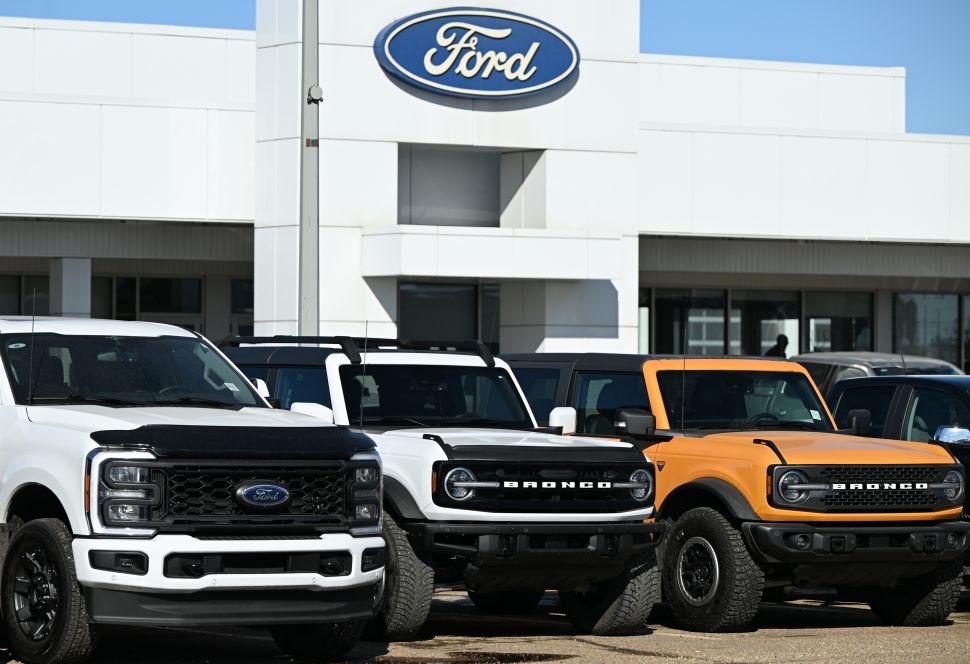Ford (F) dealership ” width=”970″ height=”665″ data-caption=’Ford is offering new consumer discounts in response to tariffs. <span class=”lazyload media-credit”>Artur Widak/NurPhoto via Getty Images</span>’>
Fresh discounts, hiked prices and paused production are among the strategies that America’s largest carmakers are embracing in response to the Trump administration’s 25 percent tariffs on imported cars, which took effect last week. “They’re taking multiple paths,” Karl Brauer, executive analyst with iSeeCars.com, told Observer. In addition to considering longer-term approaches, such as shifting production to the U.S. from abroad, carmakers are looking at short-term options to prevent damage to their business if tariffs go away in the near future. “They’re kind of trying to prepare for both contingencies,” Brauer added.
In some cases, companies are capitalizing off of the current environment. Ford, for example, is currently offering employee discounts to the wider public in a bid to encourage sales by “responding to consumer fears,” noted Brauer. Carmakers like Volkswagen (VWAPY), meanwhile, have taken the opposite approach and begun raising prices to reflect the impacts of tariffs. Others, like Chrysler owner Stellantis, have paused production abroad or begun the process of boosting domestic manufacturing.
Here’s a look at how major automakers are responding to the moment:
Ford
After the 25 percent tariffs went into effect on April 3, Ford quickly released an offer that it described as “a handshake deal for America.” Until June 2, U.S. customers will be able to purchase 2024 and 2025 models at an employee discount. This offer is included on top of a pre-existing promotion running until June 30 that offers a complementary home charger for customers buying one of their electric vehicles (EVs).
“We understand that these are uncertain times for many Americans,” said the company in a press release. “Whether it’s navigating the complexities of a changing economy or simply needing a reliable vehicle for your family, we want to help.”
Stellantis
Stellantis, the parent company of brands like Jeep and Ram, is also cutting prices in light of the levies. Its employee discount program, which the company described as “an exciting and competitive enhancement,” will be extended to consumers through April 30.
The company will also pause production across plants in Canada and Mexico. Work at its assembly plant in Windsor, Canada, will be halted for two weeks. An additional facility in Toluca, Mexico, will shut down for a month. These pauses will cause 900 workers to be laid off temporarily at supporting facilities in the U.S.
General Motors
General Motors (GM) is reportedly planning on boosting domestic production of its light-duty trucks. This will be done by hiring hundreds of temporary workers at its Fort Wayne, Ind., assembly plant to aid with manufacturing of the Chevrolet Silverado and GMC Sierra trucks, half of which are currently made by GM in Mexico and Canada.
Jaguar
The England-based Jaguar is putting a hold on its U.S. shipments entirely for April. Around one-fourth of its Britain-made cars were sold in North America last year. The shipment pause will help Jaguar “develop our mid- to longer-term plans,” the company told Bloomberg.
Volkswagen
The levies will soon have a clear impact for consumers of Volkswagen vehicles, the majority of which are about to become more expensive. The German carmaker, which imports nearly all of the cars it sells in America, is reportedly planning on adding an “import fee” to such vehicles later this month. Volkswagen is set to decide on the details of this price hike by mid-April.
The company’s rail shipments of cars from Mexico to the U.S. have been paused for the time being. It’s also planning to cut back on sales incentives.
Hyundai
Hyundai has promised to keep its prices steady over the next two months. A day after the tariffs came into effect, it launched its “Customer Assurance” program, which guarantees model prices will remain the same until at least June 2. “We know consumers are uncertain about the potential for rising prices, and we want to provide them with some stability in the coming months,” said José Muñoz, Hyundai’s co-CEO, in a statement.
Toyota
It’s business as usual, too, at Toyota, which has no plans to raise vehicle prices or make changes to its operations in the near future. In light of another round of 25 percent tariffs that will impact imported car parts as of May 3, the automaker has told part suppliers that it will help cover the costs associated with such levies, according to The Nikkei.
Tesla
Even EV-makers like Tesla (TSLA), which manufactures all of its U.S. cars in California and Texas, will inevitably be affected by next month’s component levies, given that between 30 to 40 percent of its vehicle parts are sourced from abroad.
“Tesla is not unscathed here,” Tesla CEO Musk wrote in an X post last month. Musk, who works closely with the Trump administration as head of the government’s Department of Government Efficiency, also seemingly departed from the president’s views on tariffs more broadly during a recent talk in which he called for a “zero-tariff situation” between the U.S. and Europe.

